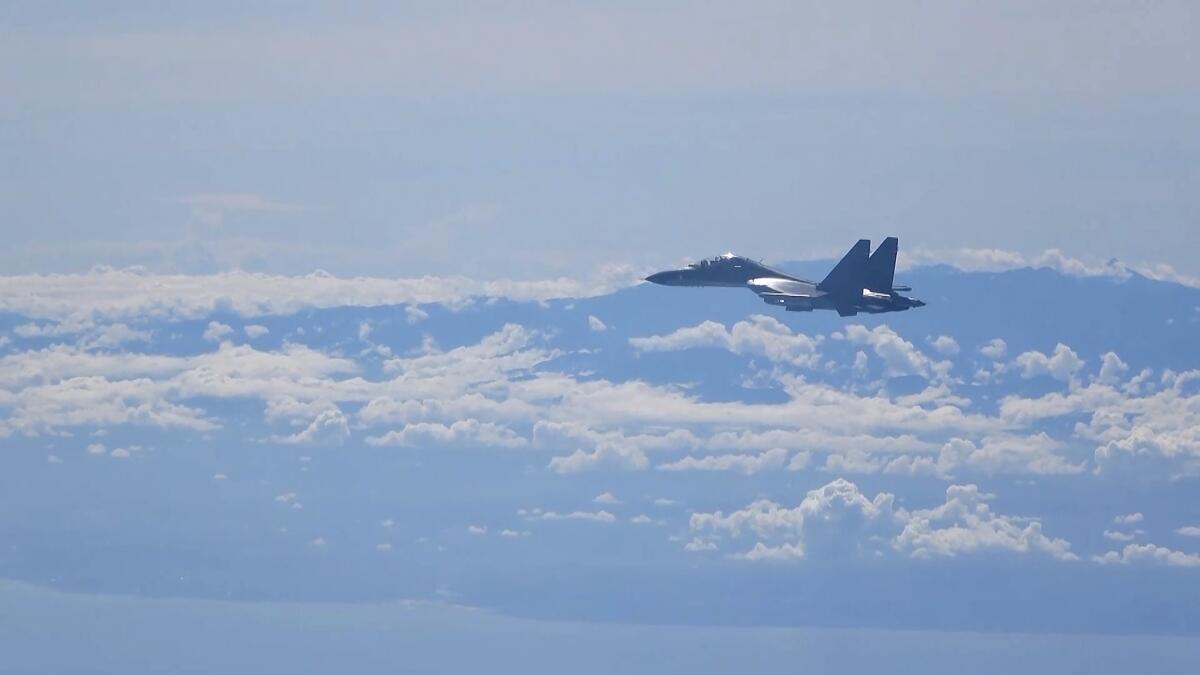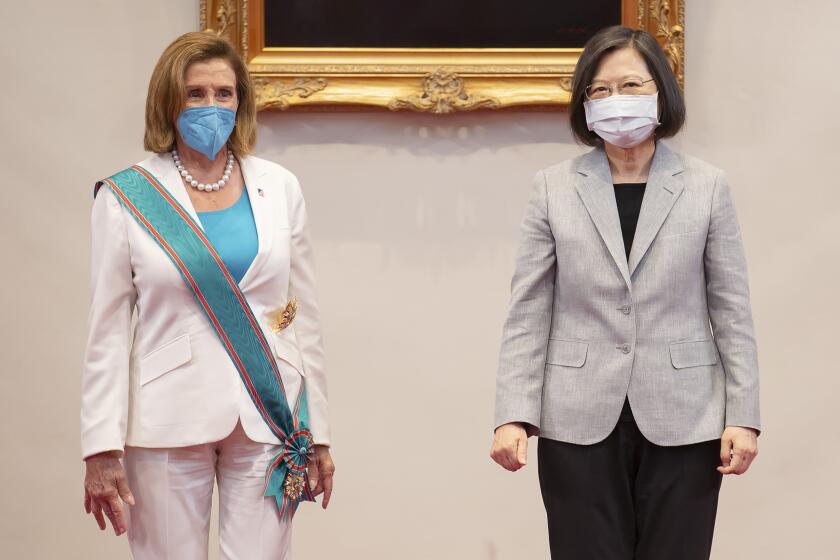China’s military drills appear to simulate attack, Taiwan says

- Share via
BEIJING — Taiwan said Saturday that China’s military drills appeared to simulate an attack on the self-ruled island, after multiple Chinese warships and aircraft crossed the median line of the Taiwan Strait following U.S. House Speaker Nancy Pelosi’s visit to Taipei that infuriated Beijing.
Taiwan’s armed forces issued an alert, dispatched air and naval patrols around the island, and activated land-based missile systems in response to the Chinese exercises, Taiwan’s Ministry of National Defense said on Twitter.
China launched live-fire military drills following Pelosi’s trip to Taiwan, saying that it violated the “one-China” policy. China sees the island as a breakaway province to be annexed by force if necessary, and considers visits to Taiwan by foreign officials as recognizing its sovereignty.
Taiwan’s army also said it detected four unmanned aerial vehicles flying in the vicinity of the offshore county of Kinmen on Friday night and fired warning flares in response.
The four drones, which Taiwan believed were Chinese, were spotted over waters around the Kinmen island group and the nearby Lieyu Island and Beiding islet, according to Taiwan’s Kinmen Defense Command.
Kinmen, also known as Quemoy, is a group of islands only six miles east of the Chinese coastal city of Xiamen in Fujian province in the Taiwan Strait, which divides the two sides that split amid civil war in 1949.
China’s furious response could drive more Taiwanese toward independence and push neighboring Asian nations to strengthen their defense strategies.
“Our government & military are closely monitoring China’s military exercises & information warfare operations, ready to respond as necessary,” Taiwan’s President Tsai Ing-wen said on Twitter.
“I call on the international community to support democratic Taiwan & halt any escalation of the regional security situation,” she added.
The Chinese military exercises began Thursday and are expected to last until Sunday. So far, the drills have included missile strikes on targets in the seas north and south of the island in an echo of the last major Chinese military drills in 1995 and 1996 aimed at intimidating Taiwan’s leaders.
Taiwan has put its military on alert and staged civil defense drills, while the U.S. has deployed numerous naval assets in the area.
The Biden administration and Pelosi (D-San Francisco) have said the U.S. remains committed to a “one-China” policy, which recognizes Beijing as the government of China but allows informal relations and defense ties with Taipei. The administration discouraged but did not prevent Pelosi from visiting.
China has also cut off defense talks with the U.S. and imposed sanctions on Pelosi in retaliation for the visit.
Pelosi said Friday in Tokyo, the last stop of her Asia tour, that China will not be able to isolate Taiwan by preventing U.S. officials from traveling there.
Pelosi has been a longtime advocate of human rights in China. She, along with other lawmakers, visited Beijing’s Tiananmen Square in 1991 to support democracy two years after a bloody military crackdown on protesters at the square.
Meanwhile, cyberattacks aimed at bringing down the website of Taiwan’s Ministry of Foreign Affairs had doubled between Thursday to Friday, compared with similar attacks ahead of Pelosi’s visit, according to Taiwan’s Central News Agency.
Other ministries and government agencies, such as the Ministry of Interior, also faced similar attacks on their websites, according to the report.
Such attacks are aimed at overloading a website with requests for information that eventually crashes it, making it inaccessible to other users.
The Central News Agency also reported that the deputy head of Taiwan Defense Ministry’s research and development unit, Ou Yang Li-hsing, was found dead in his hotel room after suffering a heart attack. He was 57 and had supervised several missile production projects.
The report said his hotel room in the southern county of Pingtung, where he was on a business trip, showed no signs of intrusion.
Taiwanese overwhelmingly favor maintaining the status quo of the island’s de facto independence and reject China’s demands that the island unify with the mainland under Communist control.
Globally, most countries subscribe to the “one-China” policy, which is a requirement to maintain diplomatic relations with Beijing.
Any company that fails to recognize Taiwan as part of China often faces swift backlash, sometimes with Chinese consumers pledging to boycott its products.
On Friday, Mars Wrigley, the manufacturer of the Snickers candy bar, apologized after it released a video and materials featuring South Korean boy band BTS that had referred to Taiwan as a country, drawing swift criticism from Chinese users.
In a statement on its Weibo account, the company expressed “deep apologies.”
“Mars Wrigley respects China’s national sovereignty and territorial integrity and conducts business operations in strict compliance with local Chinese laws and regulations,” the statement said.
In a separate post, the firm added that there is “only one China” and said that “Taiwan is an inalienable part of China’s territory.”
More to Read
Sign up for Essential California
The most important California stories and recommendations in your inbox every morning.
You may occasionally receive promotional content from the Los Angeles Times.











